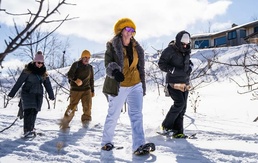The Challenges of Filming Up North
July 24, 2015

There are a lot of great things about filming in Michigan. For starters, big budget films like "Transformers: Age of Extinction" and "Red Dawn" have utilized the urban wilds of Detroit, where they’ve found endless examples of inner-city blight, abandoned factories and graffitied walls to serve as backdrops for various apocalyptic scenarios.
Any filmmaker who’s worked here cites the uniqueness of our remote locations, as well as our urban areas. One of the assets of northern Michigan is that it can morph into myriad settings. Sand dunes can represent deserts, lakes can resemble ocean vistas, woods can hide rustic monsters and many towns represent similar small town locales elsewhere in the Midwest. And, if you drive just a couple of hours, you can even film a sunrise over water and a sunset over water, both in the same day.
Yet, despite the many positive film attributes our state can boast, in June, a Senate panel passed a bill to end the Michigan Film Incentives program as of Oct. 1, 2016, and to also cease funding for the Michigan Film Office itself. According to the film office, the film industry has reportedly spent more than $1.3 billion in Michigan since the incentives began in 2008, while the programs cost the state $450 million.
ECONOMY BOOSTER
In a Detroit Free Press article, Senate representatives declared that the state has "other priorities" to focus on, most notably repairs to the Michigan's roads system.
In that same article, one senator, Arlan Meekhof, pointed out that, in his opinion, other states do film incentive programs better than Michigan. So he doesn't see the need for the separate $400,000 budget that has been covering the costs of the film office and its five-person staff.
Some filmmakers view this as a sign that the film industry is no longer welcome in Michigan, in spite of the many jobs it creates and the positive spin it puts on the state.
They’re confused, considering that many other states jump at the chance to even be considered for filmmaking opportunities.
Traverse City filmmaker Cam White has spent a good chunk of his film career in Los Angeles. While there, he traveled a great deal to shoot on site in various states, and has seen the incentive programs in action.
"I worked in production for a company that shot in North Carolina, which has a big film incentive program," he explained. "We shot three HBO movies, scenes for a Nicholas Sparks movie. They hire half of the city when movies film there. Plus, they rent cars, fill up restaurants, everything's taken up by production. It's great for the local economy."
"But here in TC," he continued, "you don't see the filmmaking trucks around, you don't see active filming units, you just don't get that excitement that something’s going on. And it’s a real shame, because you could."
White’s inside view is that, even when the Michigan Film Incentive was 100 percent active, it wasn't easy to access funding for a particular project.
"You'd hear producers say, "˜yeah, good luck actually getting the funds,’" White said. "Film producers don't like to jump through hoops. They’ll just go to another state that has bigger, better incentives."
RESOURCES WANTED
Rich Brauer, another accomplished Traverse City filmmaker, said that he knew the original director of the film office from its inception in 1979.
"That was Deryl Beasley," Brauer said, "and he worked at it. He wrestled a film office out of nothing. Back then, the film office was basically a referral service, helping location scout, find help for various things, and to schmooze the directors and offer a crew base."
It wasn't until 30 years later that the film initiative appeared.
"Now, the film office is back to doing what they used to do before: referring people," Brauer said. "But that's actually quite useful. Paramount Pictures recently called me to get help finding people on the ground here, and that's how they located me, through the film office."
The bigger problem, Brauer suggested, is the lack of filmmaking resources Up North. Anyone who's tried to rent a professional camera or lighting equipment, find a costume designer, hire set builders or crew, or schedule craft services (food catering that's specific to active film sets), knows that it's nearly impossible to find experienced professionals.
"The reason there aren’t these resources Up North is that it's all driven by economics," Brauer said. "You can find people who are willing to work on your film, and that’s great, but they’re going to be untested people. With a paid production, we often can't afford to risk it, although we do have to take our chances sometimes."
"If there were more films being made up here, you’d see somebody start up a craft services truck, you'd find people learning how to provide costuming," he continued.
Brauer said he tries to do his part by loaning his own company's cameras and other filmmaking gear to worthy projects, but with little help from the state, it’s truly going to take a village to make a film, and sometimes even that's not enough.
"Nobody really owns anything in this business. It’s all either rented or stolen," he laughed.
"But whether or not I want to be a clearinghouse, I just am. We’re one of very few dedicated filmmakers up here, so we try to help where we can."
LOST CAUSE
In a telephone conversation with Jenell Leonard, director of the Michigan Film Office, it was clear she doesn’t have much control over the recent film decisions.
"Well"¦ we have a very strong, diverse portfolio of filmmakers in our database," she said.
"And we do have some of the best, most hardworking and respectful people both behind the line and in front of the camera, and some of most beautiful diverse locations. So"¦ we are trying to retain filming talent within the state."
Leonard, who just began her position in February, said she thinks education is key to improving support for Michigan filmmaking. But with funding ending next year, she doesn't have much longer to pursue that angle, or any angle, for that matter. So she can only work on the short-term.
"Our focus is very much on the promotional aspect of filmmaking, to change the perception of the industry here," she said. "We do make sure that film job seekers are connected with employers via our website directory (mi.reel-scout.com). But mostly, we are working to educate people about filmmaking, to help them realize that film is deeper than they might perceive."
Trending

A Tale of Two Historic Buildings in Elk Rapids
For one iconic building in Elk Rapids, a 2025 controversy has largely subsided. But for another it continues, as ownership t… Read More >>
There and Back Again at Old Town Playhouse
We’re going on an adventure! And there will be trolls, goblins, and giant spiders! But also good friends and better ta… Read More >>
Slushy Outdoor Fun
Ready to get a little sloshy—we mean slushy? Local wineries and winter-weather hotspots are leaning into the season wi… Read More >>


